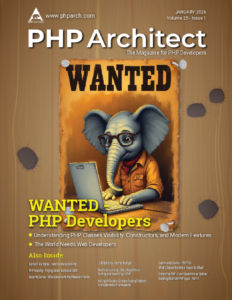PHP Alive And Kicking – Episode 12 – Rob Allen
Rob’s journey into PHP started in 1995—way back in the last century, as he puts it—when he got headhunted from a C++ role testing mobile phones. The twist? He was in an online gaming guild that needed a website, discovered PHP 3, and thought “this is way easier than writing C++.” Three decades later, he’s still here.
The Accidental Path to Independence
After years at various companies—some you’ve heard of, some you haven’t—Rob found himself constantly getting made redundant through no fault of his own. Companies got bought, restructured, or just folded. Eventually, someone planted the seed: “Why don’t you just go independent?” Fifteen years later, he’s still doing it, and the variety keeps it interesting.
APIs Are His Jam
When people ask what Rob does, the answer is simple: APIs. REST APIs specifically, though he’s increasingly working with OpenAPI specifications. Need someone to build the backend that talks to your mobile app? That’s Rob’s specialty. Building the thing that other systems talk to? Also Rob. He’s carved out a niche and he’s sticking to it.
The Uncomfortable Truth About Marketing
Here’s the challenge nobody talks about: how do you get clients when your clients aren’t developers? Rob’s clients are CTOs and CEOs who need developers, so traditional developer networking has to work backwards. He speaks at conferences, writes for PHP Architect, stays visible in the community—and hopes it eventually translates into someone saying “I know a guy.”
Mike’s American Healthcare Debut
In a delightful tangent, Mike shares the story of how he injured his finger setting up speakers at PHP[tek] and got to experience American urgent care. For the record, it was a lighting speaker that fell on his finger, not a human speaker. This injury happened right before meeting Chris for the first time—who Mike thought was American until Chris spoke with a very British accent. Brain: officially confused.
Community vs. Networking: The Friendly Version
“Community” sounds so much less intimidating than “networking,” doesn’t it? Rob, Mike, and Chris all agree: being part of the community—whether online or in person—has been the single biggest factor in their career success. You don’t have to be an extrovert. You don’t have to speak at conferences (though Mike just submitted talks to Tech 26—someone’s growing!). Just show up. Say hi. Join the Discord. Play chess. Answer questions when you can.
The Chess Club Career Strategy
Mike admits most of his interaction in the PHP Architect Discord wasn’t even technical—he set up a chess club and gave Eric and John tips on the game. That level of “just being around” eventually turned into a job. The lesson? You don’t need to know everything about PHP to be part of the community. Just be present.
Why People Want You to Succeed
Rob drops wisdom for anyone terrified of public speaking: the audience wants you to succeed. They’re not hoping you fail. You could talk about your dogs for 15 minutes and people would still cheer you on. It’s only a slight comfort when you’re “absolutely bricking it,” but it’s true.
Listen to hear why Rob thinks remote work hasn’t killed in-person community building, and how being on a C++ mailing list 30 years ago set the foundation for everything that came after.
PHP Architect Social Media:
X: https://x.com/phparch
Mastodon: https://phparch.social/@phparch
Bluesky: https://bsky.app/profile/phparch.com
Discord: https://discord.phparch.com
Subscribe to our magazine: https://www.phparch.com/subscribe/
Streams:
Partner
This podcast is made a little better thanks to our partners
Displace

Infrastructure Management, Simplified
Automate Kubernetes deployments across any cloud provider or bare metal with a single command. Deploy, manage, and scale your infrastructure with ease.
https://displace.tech/
PHPScore
![]()
Put Your Technical Debt on Autopay with PHPScore
Honeybadger.io
Honeybadger helps you deploy with confidence and be your team’s DevOps hero by combining error, uptime, and performance monitoring in one simple platform. Check it out at honeybadger.io
Music Provided by Epidemic Sound
Listen
Podcast (episodes): Play in new window | Download | Subscribe
Transcript
PHP Alive And Kicking – Episode 12 – Rob Allen
Show Summary
In this episode of PHP Alive and Kicking, the hosts continue exploring the evolving landscape of PHP development, touching on practical tools, open source contributions, and ways developers can stay productive while keeping their code modern. They discuss real-world experiences, community stories, and share thoughts on the ongoing growth of PHP in 2025.
Transcript
| Air date | November 7, 2025 |
|---|---|
| Hosted by | Mike Page, Chris Miller |
| Guest(s) | Rob Allen |




